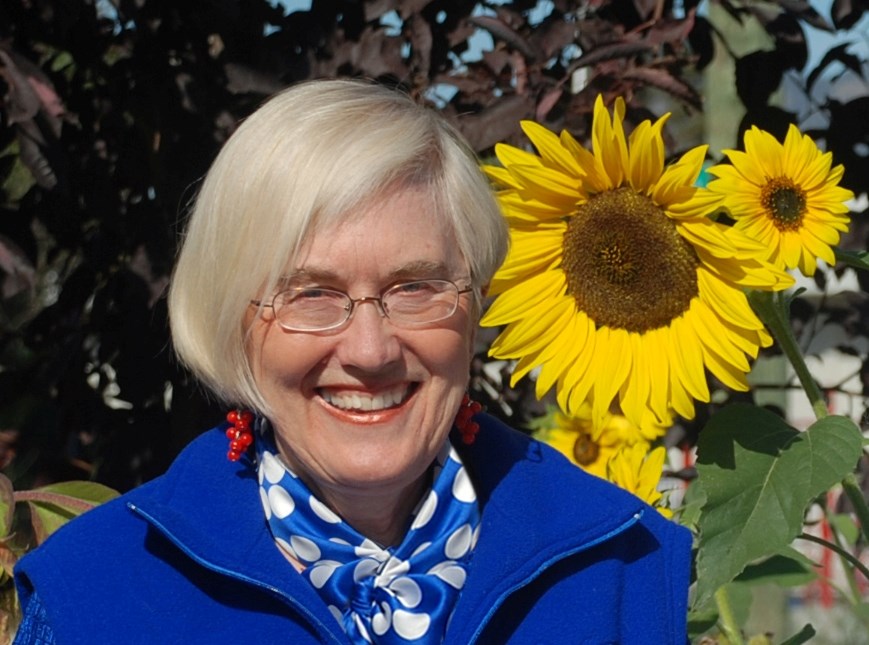An author with a name familiar to the area has released a book, Consider the Sunflowers, that draws heavily from her family history and Mennonite roots.
Elma Schemenauer, who grew up near Elbow and now lives in Kamloops, has written novels before, but this one was heavily based on family stories, and is 14 years in the making.
“It took me a long time, but it’s because I didn’t focus enough. I didn’t think enough about where it was going,” she said.
She began by doing a lot of research into her family’s background and then ended up writing a whole book about her Mennonite history dating back to the 1600s. When she realized that wasn’t the story she wanted to tell, she started on a new one, focusing on the viewpoint of a little girl, Clara. However, she wanted to tell the story from an adult viewpoint and so had to scrap all the parts that focused on Clara. Last October, the story she wanted to tell was finally released.
“I’ve always been interested in history and community and family and how families relate to each other,” she said.
Schemenauer’s publishing career began when she started work at a publishing company in Toronto. She was supposed to be an editor but did a lot of writing for people who asked her to write certain things. She said she loved writing about anything so she didn’t mind it, but now she’s focusing on her own writing.
“I’ve written so much and now I want to concentrate on my novels,” she said.
Consider the Sunflowers is about a couple in 1940s Saskatchewan and their conflicts in their marriage. It was based on stories she heard from her Mennonite relatives.
“We were very isolated on the farm so it’s kind of based on the isolation of that and how it affected my parents,” Schemenauer said.
Her favourite part of the whole book process is revision and editing. She also connects with writers online, getting them to give her advice. One is an author from Alberta.
“She has such an insight. When she comments, then I see how it can be made so much better,” Schemenauer said. “She draws it out of me.”
Another example is a 24-year-old male law student from New York state. Schemenauer found it useful to get a young male perspective from him so that her young male protagonist, Frank, would be realistic.
“What are the chances that, if we lived in the same town, we would develop a relationship like that? Not high,” she said. “Are we going to go out for coffee, a 24-year-old and this woman who’s way older? We wouldn’t have met other than on the Internet.”
However, her least favourite part of the process is simply finding a publisher. She sent the manuscript to many publishers and agents before getting a reply from Borealis Press.
“You have to develop a thicker skin because when they keep saying no, they usually say, ‘It doesn’t meet our needs at the present time,’” she said. “It’s kind of a nice way of saying it, but you know it’ll never meet their needs at any time. They’ll reject you and that’s the hardest part.”
She found out Borealis Press accepted her manuscript when her husband offhandedly mentioned that “Frank called for you.” Since her protagonist is named Frank, she was very confused at first.
“I thought, ‘Since when do characters in books call their authors?’ It was kind of creepy,” she said, laughing.
The small press is based in Ontario and was overall good to work with, but sometimes they didn’t really know what it was like in Saskatchewan. Initially, the cover design featured a woman looking out a lot of trees, and Schemenauer said she had to put up a bit of a fight about it.
“It was just wrong,” she said. “It just doesn’t look like that on the Prairies … I really had to put my foot down and say it’s not like that at all.”
Though she said she based some characters on family – and her sister recognized a lot of people in the book – the reaction has been largely positive from her friends and family.
She’s currently working on a book set in the 1970s and would like to return to the 1940s again if she can get a new plot.
Some themes she wanted to get across in the book were to never give up and to have faith in God. The first theme kind of extends into her advice to writers in general.
“For other authors, it’s good advice to just keep trying,” she said. “Keep making it better and keep trying.”




